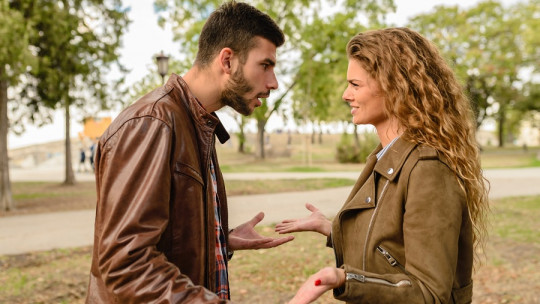The dynamics of friendships can be complex and varied, and there are several reasons why friends may drift away without apparent clear reasons such as life changes, differences in interests, personal problems, unresolved conflicts or lack of commitment in the relationship, among others. others. They are unpleasant situations that disconcert us, especially when we do not know what is the reason that has caused this behavior in our friend.
In these situations, it is essential to stop and estimate the seriousness that what happened means to us and, based on this, act on it to avoid the discomfort that this may have caused us. In this PsychologyFor we will talk about why there are friends who distance themselves for no reason and what to do. Discover the most frequent reasons why friends distance themselves, the consequences that this causes and advice on how to act in these situations.

Friendships are an essential part of our lives, providing support, joy, and a sense of belonging. However, there are times when friends may distance themselves without any apparent reason, leaving us feeling confused and hurt. Understanding why this happens and knowing how to respond can help maintain emotional well-being and possibly salvage the friendship. This article explores common reasons behind such distancing behavior and offers practical advice on how to handle it.
Understanding Friendship Dynamics
Friendships, like any other relationships, go through different phases and changes. It’s important to recognize that these changes are a natural part of life, and not all distancing is necessarily negative.
The Nature of Friendships
Friendships are built on mutual interests, trust, and shared experiences. Over time, these elements can evolve, leading to changes in the dynamics of the relationship.
Phases of Friendship
Friendships often go through various phases, including formation, growth, maintenance, and sometimes, decline. Understanding these phases can provide insight into why a friend might distance themselves.
Common Reasons Friends Distance Themselves
There are several common reasons why friends might distance themselves, many of which are not personal or intentional.
Personal Life Changes
Life changes such as moving, changing jobs, or starting a family can affect the amount of time and energy a person has for friendships.
Stress and Mental Health
Stress, anxiety, or depression can cause someone to withdraw from social interactions. A friend might distance themselves as they deal with their mental health issues.
Relationship Conflicts
Conflicts or misunderstandings within the friendship can lead to distancing. Sometimes, the conflict might not be apparent, but unresolved issues can cause a rift.
Growth and Change
As people grow and evolve, their interests and priorities may change. This natural evolution can lead to friends drifting apart as their paths diverge.
External Influences
Influences from other relationships, work, or personal commitments can also impact a friendship. External pressures might make it difficult for a friend to maintain close contact.
Miscommunication
Miscommunication or lack of communication can cause friends to drift apart. If one party feels neglected or misunderstood, it can lead to distancing.
Fear of Confrontation
Some people might avoid addressing issues or feelings directly out of fear of confrontation, leading them to distance themselves instead.
The Impact of Friends Distancing Themselves
When friends distance themselves, it can have a significant emotional impact, leading to feelings of confusion, sadness, and even self-doubt.
Emotional Reactions
Feelings of rejection, confusion, and sadness are common reactions when a friend distances themselves. It’s important to acknowledge and process these emotions.
Impact on Self-Esteem
A friend’s distancing can affect self-esteem, leading to self-doubt and questioning of self-worth. It’s crucial to remember that their actions are often not a reflection of your value.
Effects on Social Life
The distancing of a friend can impact your social life, especially if the friend was a significant part of your social circle. Finding ways to stay socially connected is essential.
Why are there friends who walk away for no reason?
The reasons why some friends distance themselves for no apparent reason are varied, since they depend on numerous internal factors (psycho-emotional) and external (socio-environmental). At the same time, these two types of factors can manifest themselves both in your friend and in yourself, becoming significant reasons that lead your friend to walk away.
In more detail, below, we explain why there are friends who distance themselves for no reason, both due to internal and external factors.
Causes related to your friends
The possible reasons why your friends distance themselves from you may be the following:
- Internal: change in personal interests, boredom, feeling undervalued, anger or discomfort due to an unresolved conflict and/or lack of commitment to the relationship, among others.
- External: judgments and manipulation of third parties towards you that condition their distance, the appearance of new people in your life, the beginning of an intimate relationship, school/work/family overload, etc.
Causes related to yourself
Sometimes friends distance themselves for no reason, but this distancing is related to their own behaviors. Let’s see what attitudes usually cause distancing between friends:
- Internal: arrogance and manipulation, neglect of the relationship, unconscious anger, whose resentment separates your friends, mockery, unconscious judgment, competitiveness, chronic depressive and/or dependent state, etc.
- External: third people who judge and do not value your friends enough, greater dedication to third people changing existing habits until now, etc.
What happens when friends walk away for no reason?
The consequences of friends who walk away for no reason may vary depending on various factors, such as the degree of appreciation and relationship we have with them, our inner strength, the social network in which we operate and the evolutionary stage in which we find ourselves. The emotional impact if we are supported by family and other friends, or if we are in childhood, adolescence, youth or adulthood.
Sometimes this situation can generate deeper pain, giving rise to three fundamental emotional responses. Next, let’s see what happens when friends drift apart for no reason.
Disorientation, anxiety and inner restlessness
The disorientation, anxiety and inner restlessness that we experience when faced with the loss of friends and imminent loneliness can have various manifestations. Emotional disorientation can result in feeling of not knowing how to face life without the presence of those close friends.
Anxiety can lead to intrusive thoughts about why you lost and fears about your ability to make new connections. Inner restlessness can manifest itself as a feeling of emotional emptiness and the difficulty in finding solace. Therefore, the main consequences of all this are:
- intense depression: The lack of a support network can contribute to a deterioration in emotional well-being, leading to more intense depressive states.
- Social isolation: Difficulty managing these emotions can result in social withdrawal, contributing to isolation and loneliness.
Fear and uncertainty regarding the future
Fear and uncertainty regarding the immediate future derive from the emotional lack of protection that we experience. Lack of support from friends can lead to feeling of vulnerability with fears related to loneliness, lack of emotional support and difficulty facing daily challenges.
Uncertainty about how to continue without the previous social support network can lead to the anticipation of negative events, contributing to higher levels of stress and worry So that this does not happen, in this article, we explain how to manage uncertainty.
The most common consequences of fear and uncertainty about the future due to friends who walk away for no reason are:
- Development of social phobias: The inability to overcome fear and uncertainty can lead to the development of social phobias, making it difficult to interact with others.
- Decision paralysis: Uncertainty about the future can cause paralysis when making important decisions.
Anger and resentment
Anger and resentment towards friends for their behavior can trigger a series of emotional and behavioral consequences. Anger can manifest as feeling of injustice and disappointment in the face of perceived betrayal. Accumulated resentment can affect our future relationships, as it could cause difficulties in trusting others. In this article, we give you the information on How to stop being spiteful, so that this does not affect you.
Unmanaged expression of these emotions can lead to the following:
- Antisocial behavior: The accumulation of anger and resentment can contribute to the development of antisocial behavior, affecting personal and work relationships.
- Chronic distrust: Difficulty overcoming anger and resentment can lead to chronic distrust of others, negatively impacting future relationships.
What to do when your friends walk away for no reason
When there are friends who distance themselves for no reason, unpleasant consequences can arise in their mood. The evolution of these consequences will depend on how the problem that, unexpectedly, has arisen is addressed. Below, we provide you with tips that will help you when a friend walks away from you, giving you strength and the right tools to get your life back on track:
- Investigate the causes: reflect on the possible reasons that have led to this situation, honestly recognizing that part of you could have contributed to a friend stopping talking to you for no reason.
- Open communication: Ask your friends directly what happened that made them decide to move away. If you do not feel comfortable doing so, it is important that you seek the help of third parties who can mediate.
- Clear up misunderstandings: If the causes are misunderstandings, clarify the situation to restore relations. In this article, we explain how to resolve a conflict through dialogue.
- Take responsibility: If the distance is due to some misconduct on your part, it is crucial to take responsibility and ask for forgiveness if you want to rebuild your relationships.
- External causes: If the departure of your friends is due to personal choice or socio-environmental factors, express your willingness to resume the friendship, even if the restoration does not depend directly on you.
- Grief process and social support: In the case of real loss of friendships, it is normal to go through a grieving process. Seek support from your social network, and if necessary, consider professional help.
- Personal reconstruction: If it is not possible to resume lost friendships, work on personal reconstruction based on the crisis experienced. Adopt a new perspective on life, understanding that it is a constant change. This will provide you with the necessary strength to positively face this crisis and those that may arise in the future.
How to Respond When a Friend Distances Themselves
Responding thoughtfully and empathetically can help you navigate the situation and possibly reconnect with your friend.
Self-Reflection
Reflect on your own actions and the dynamics of the friendship. Consider if there were any changes or issues that might have contributed to the distancing.
Open Communication
Reach out to your friend with open and honest communication. Express your feelings and concerns without placing blame, and ask if there’s anything you can do to support them.
Giving Space
Sometimes, giving your friend space can be beneficial. Respect their need for distance while letting them know you’re there for them when they’re ready.
Seeking Clarity
If you’re unsure why your friend is distancing themselves, it’s okay to seek clarity. Gently ask if something has changed or if there’s anything bothering them.
Focusing on Yourself
Use this time to focus on your own well-being and personal growth. Engage in activities you enjoy, connect with other friends, and take care of your mental health.
Being Patient
Patience is key. Relationships take time to heal and evolve. Give your friend and yourself the time needed to navigate this change.
When to Let Go
Knowing when to let go of a friendship is a difficult but sometimes necessary decision.
Assessing the Situation
Evaluate the situation objectively. If the friendship consistently brings more pain than joy, it might be time to consider letting go.
Recognizing Unhealthy Patterns
If the friendship involves unhealthy patterns such as manipulation, constant negativity, or lack of respect, it may be best to distance yourself for your own well-being.
Moving Forward
Moving forward doesn’t mean forgetting the friendship but rather acknowledging its place in your life and focusing on your future.
Friendships are complex and dynamic, and it’s natural for them to change over time. When a friend distances themselves, understanding the possible reasons and knowing how to respond can help manage the situation with empathy and grace. Remember to prioritize your well-being and seek out connections that uplift and support you.
FAQs
Why do friends distance themselves for no reason?
Friends might distance themselves due to personal life changes, stress, mental health issues, growth and change, external influences, miscommunication, or fear of confrontation.
How can I handle the emotional impact of a friend distancing themselves?
Acknowledge and process your emotions, focus on self-care, and seek support from other friends or a counselor if needed.
Should I confront my friend about their distancing behavior?
It’s important to communicate openly and honestly. Express your feelings and ask if there’s anything you can do to support them, but avoid placing blame.
When is it time to let go of a friendship?
Consider letting go if the friendship consistently brings more pain than joy, involves unhealthy patterns, or if efforts to reconnect are unsuccessful.
How can I maintain my social life if a close friend distances themselves?
Engage in activities you enjoy, connect with other friends, and seek out new social opportunities to maintain a fulfilling social life.
This article is merely informative, at PsychologyFor we do not have the power to make a diagnosis or recommend a treatment. We invite you to go to a psychologist to treat your particular case.
If you want to read more articles similar to Why there are friends who distance themselves for no reason and what to do, we recommend that you enter our Social Psychology category.
Bibliography
- González, Al. (2023). Best friends: Build healthy friendships, let go of unhealthy ones, and heal past wounds. Montena Publishing House.








